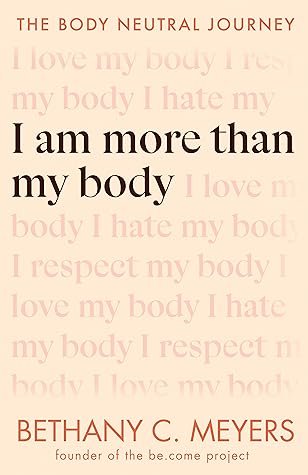More on this book
Kindle Notes & Highlights
It’s more the idea that bodies are bodies, you are where you are, and that’s okay. You love yourself as a person, not just as a body.
Body neutrality is not saying that you shouldn’t have any feelings about your body or that you should never think about your body, or that your body doesn’t matter. But it is saying that your body does not dictate your worth. You are more than a body, and your value as a person extends far beyond your physical presence.
At its most extreme, diet culture is the social consensus that your appearance and body shape are more important than any other part of you—more important than your personality and character, achievements and contributions. And yes, even more important than your health.
That was the moment I realized I needed to learn to love myself and my body. I was so tired of apologizing on behalf of my body as opposed to apologizing to my body for everything I had put it through.”
Weight is surface-level; who you are underneath remains the same. Weight loss through shame, extreme restriction, and guilt does not a happy person make. Being in touch with your emotions, healing old trauma, practicing intuitive eating, exploring movement for joy . . . these things can dramatically change your outlook. Yes, they can lead to weight loss, but they can also lead to weight gain. I want to be explicit about this very early on: I’m not demonizing someone’s weight changing, because bodies fluctuate. But I am asking us to look at the intent and the method, and explore if changing our
...more
I’m really having a lot of negative feelings about my body. (Acknowledge your feelings without judgment.) I wonder why these thoughts are coming up so strongly today? (Explore the hidden reasons—stress, lack of sleep, emotional distress, sickness, societal wiring, hormones, etc.) I’m going to be extra gentle with myself during this time. My body is experiencing so much and yet it is still able to ____. (Reconnect with yourself, and thank your body for what it does for you.)
For example, I have reminded myself that there is so much more to discover and enjoy beyond the physical constraints of your body. Whether it’s using your imagination, being creative, connecting with people, or discovering new passions, the fleshly body is only one part of who we are.”
At the end of the day, there is always something to strive for and there is always something to improve upon—that’s the way our world is set up. But happiness doesn’t come from self-harm or self-abuse or self-delusion. Happiness doesn’t come from restriction and punishment, self-hatred and shame. Happiness doesn’t come from shitting rainbows and pretending that we love ourselves every single day when actually we’re struggling. Happiness comes from honest acceptance, something that body neutrality has the power to help you find.
As Lottie says, “It is society that tells us our body is a measure of the quality of our existence. I guess realizing that is the first step toward reaching body neutrality—though I appreciate it’s a lot easier said than done.”
Am I . . . ? Feeling connected to my body? Enjoying the release of emotion? Appreciating the functions of my body without criticism? Able to identify areas of tightness, flexibility, pain, and strength? Listening to and honoring my body’s needs? Moving without judgment or set expectations? When we are able to answer yes to these questions, we are on track for participating in neutral movement. On the flip side you may notice that your mindset is less than neutral. Ask yourself these questions: Am I . . . ? Focused on my body’s failings? Concentrating on the amount of time spent in movement
...more
No matter what you have been taught about your body, your identity, or your aspirations, you are the one who gets to decide what you keep and what you leave behind.
Talk to your anxiety. There is a makeup artist I know named Katy. I was on a trip with her one time, and we were talking about anxiety. Katy told me that when you are feeling anxious—about your appearance, or anything else—to talk to it. Challenge your anxiety as if it were a person, and dare it to make you feel worse. When you confront anxiety, it freezes up. It’s a tactic that has changed my life.
The ignorance stamp. One of my favorite tools is called the ignorance stamp. Imagine that you have a rubber stamp with the word “ignorant” across it. When someone says something that is harmful or hurtful, imagine stamping their forehead. Then, as they continue to speak their harmful words, all you see is the word “ignorant.” People are often not trying to be mean; they are just ignorant. I actually got some “ignorant” rubber stamps made up and I carry one in my purse!


